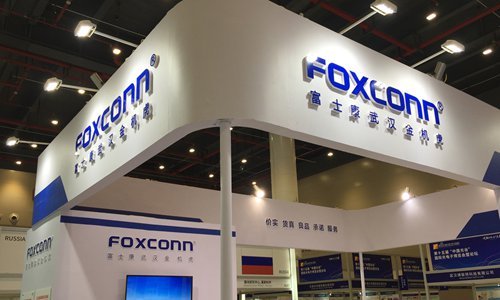
A booth of Foxconn at an exhibition hall in Wuhan, capital of Central China's Hubei Province. File photo: VCG
The woes of a Foxconn factory in the US state of Wisconsin, once hailed by US President Donald Trump as the "eighth wonder of the world", reflect problems for Trump's goal to revive US manufacturing, an industry analyst said, after state officials told the company it won't qualify for the state's tax credits, due to its failure to create enough jobs in 2019.
Wisconsin officials told the world's largest electronics manufacturer in a letter on Monday the company is not eligible for the tax credits "because Foxconn was not building a Gen 10.5 facility upon which the agreement with WEDC [Wisconsin Economic Development Corporation] was predicated."
WEDC said Foxconn hired only 281 people, not meeting the goal set out in their contract, according to media reports.
However, a statement sent by Foxconn to the Global Times on Tuesday said the plant had hired more than 520 people by the end of last year, with total investment in the state surpassing $750 million. More than $500 million was invested to build the Wisconn Valley Science Technology Park.
The company said it "complies with existing contract specifications" and its "direction of investing in Wisconsin will not change."
In 2017, Foxconn signed a contract with Wisconsin for a $10 billion, 20-million-square-foot display screen plant that would create up to 13,000 jobs. Trump hailed the deal as a move to revitalize US manufacturing.
But the current situation may sap Trump's confidence as it seems difficult for his government to promote a manufacturing revival, a veteran industry observer said.
"Foxconn has very few local partners along with its supply chain in the state, including upstream raw materials. This will affect the plant's operations," Liang Zhenpeng, a senior industry analyst who follows the company, told the Global Times on Tuesday. Liang said it's hard for Foxconn to meet its commitment to invest $10 billion.
In past decades, the supply chain for consumer electronics has moved out of the US, "but bringing it back is very difficult. For the labor-intensive, low-end processing industry, the US does not have any cost advantage," Liang noted.
Even if the US has pushed its companies to move manufacturing out of China, it will proved to be difficult as China still boasts cheaper labor costs.
At Foxconn's sprawling plants in Southwest China's Sichuan and Central China's Henan provinces, monthly wages are about 5,000 yuan ($742), while a US worker earns two to four times that much, Liang said.
Also, China has a complete chain of suppliers and raw material providers, Liang emphasized.


